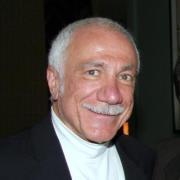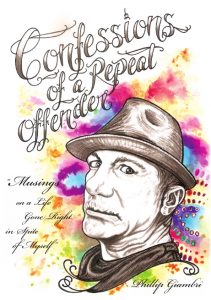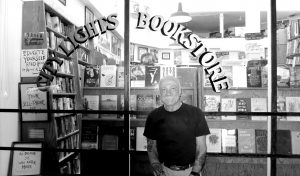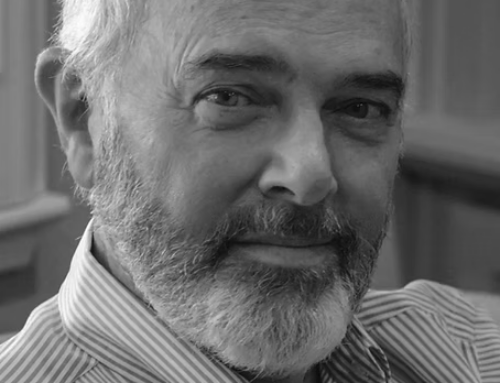 Phillip Giambri’s debut book Confessions of a Repeat Offender: Musings on a Life Gone Right in Spite of Myself is filled with stories that illustrate his divergent perspective of life. Born in South Philadelphia, at eighteen he enlisted in the US Navy and served in the Submarine Force during the Cold War. He wrote anonymously about incidents his shipmates were involved in during long periods at sea for the sub’s daily newsletter, The Silent Service Breakfast News. Giambri left the military at twenty-two and then worked as a banker, actor, announcer, hairstylist, recording engineer, photographer, mail-order minister, and computer guru. His acting career led him to New York City.
Phillip Giambri’s debut book Confessions of a Repeat Offender: Musings on a Life Gone Right in Spite of Myself is filled with stories that illustrate his divergent perspective of life. Born in South Philadelphia, at eighteen he enlisted in the US Navy and served in the Submarine Force during the Cold War. He wrote anonymously about incidents his shipmates were involved in during long periods at sea for the sub’s daily newsletter, The Silent Service Breakfast News. Giambri left the military at twenty-two and then worked as a banker, actor, announcer, hairstylist, recording engineer, photographer, mail-order minister, and computer guru. His acting career led him to New York City.
In his fifties he reconnected with friend and mentor Don Ulmer with whom he served in the Navy. He discovered that Ulmer, who also had written for the sub’s daily newsletter, was now a published author of many books. This inspired Giambri to pick up the pen and he began to write stories about his military experiences.
This tome is composed of stories written over a period of fifteen years. When he began writing again, he searched for the innocence of his youth but discovered instead a grizzled creature that lurked on the fringes of his consciousness who revealed himself as The Ancient Mariner. It is The Ancient Mariner who Giambri credits for leading him on his writing adventures. He retired at the age of sixty-five, and began to attend readings in local bars on the Lower East Side. Giambri, 74, a self-proclaimed barfly, tells his salty, sassy tales with a rugged New York City attitude.
Linda Kleinbub: How would you describe your book?
Phillip Giambri: My book is a compilation of memories and life experiences filtered by time, age, and emotional or lack of emotional attachment. As the old sailor’s saying goes, “They might not be all true but I remember them well.”
Kleinbub: Would you say that your stories are true experiences from your life?
 Giambri: All of the stories are based on true incidents; some are retold completely true, some slightly changed to protect identities and locations, and some changed for dramatic effect or to make them a bit more interesting as “stories.” A very few were just taken from an actual incident or experience and greatly embellished and fictionalized to make a good story. All of my stories start with a true seed.
Giambri: All of the stories are based on true incidents; some are retold completely true, some slightly changed to protect identities and locations, and some changed for dramatic effect or to make them a bit more interesting as “stories.” A very few were just taken from an actual incident or experience and greatly embellished and fictionalized to make a good story. All of my stories start with a true seed.
Kleinbub: Are you ever concerned about protecting the identity of the people you are inspired to write about?
Giambri: Absolutely. I go out of my way to alter stories to avoid embarrassing anyone. I want to entertain the reader and audience not take revenge on anyone or try to make anyone look intentionally bad.
Kleinbub: Why do you call yourself The Ancient Mariner?
Giambri: People always mispronounced my name when I started reading in public venues. I was always one of the oldest participants and I didn’t like being called “The Old Guy.” I thought since my early work was based on my military experience, The Ancient Mariner would be a good fit and a literary tip of the hat. I developed an image of The Ancient Mariner as a salty dog who hung out in bars with hookers and strippers and it fit the persona of the stories I was writing.
Kleinbub: Some of your poems are about encounters with beautiful woman. In “My Spy” you open with “She’s stunningly beautiful. / She tells me her name is Anastasiya. / I ask her why she’s here. / She smiles seductively but doesn’t answer.”
Giambri: That is based on a beautiful blonde Russian woman I met while attending an annual international convention of former submariners. We met on a luncheon cruise out of Portsmouth, England she was so intriguing I wanted to capture that so I took her picture. My friend said she was probably looking for a green card. I’ve embellished a few things but it is mostly based on that encounter.
Kleinbub: In your poem “A Toast to Johnny ‘E’” you tell the story of a veteran who lives a tough life. You capture the language that an Army vet would use: “I was a door gunner on a Huey back in Nam, ya’ know? / Company A, 1st Battalion, 35th Infantry, / I lit up a lot of VC with that big 50’, man! / No retreat, no surrender!”
Giambri: This is based on someone I knew. I took certain incidents from his life, and made them more dramatic. He had a beautiful wife, who left him, his life fell apart, and he was never the same again. He drank too much. The facts in that piece are true but the details are changed to protect him. I wanted the language in the poem to be authentic. I researched the terms used by veterans during the Vietnam War. Instead of saying, “I killed someone,” they’d say, “I lit up.” I was just trying to show the plight of veterans. That guy died a terrible death, and I’ve seen many of my veteran friends in similar situations. I try to make the story a universal one that touches people. The actual person is not the important part. The objective is to show the plight of veterans. I’m not writing biographies; I’m writing stories. My friend based on Johnny “E” didn’t die on the street but he died alone in a hotel. No one claimed his body. I changed the facts and the location to shield him.
Kleinbub: The opening of your book describes your first bar experience. “As we get closer to the cabin door, / a small neon sign flashes ‘Charlie’s Log Cabin Inn.’ / Uncle Leon pushes open the heavy wooden door / I’m wild with excitement and have no idea, / that I’m about to fall down the rabbit hole forever. / The darkness blinds me for a moment, / but I feel the cool air of the room on my cheeks / there’s the smell of cigarette smoke, ashtrays, beer, and peanuts. / I hear a Phillies game on the radio.”
Giambri: I grew up poor. My mother worked as a seamstress. My father had tuberculosis and didn’t work much. During the summer my parents sent me and my sister to my grandmother’s house in Somerdale, New Jersey. It was a rural farm area, with cows and horses. As a city kid it was great. I got to be outdoors, ride horses, and tend cows. My uncle was my hero. I remember an August afternoon when I was six he took me to a bar for the first time, I immediately fell in love with the place. The bartender gave me a handful of nickels to play the pinball machine, and it was then I found my home.
Kleinbub: The largest chapter of your book is titled “My Life as a Barfly” and contains the piece “Cheap Shots” with the lines “Ghost voices / from all the bars / I ever hung out in, / call out to me, / to come home. / I know / I belong with them”
Giambri: I love bars. When I found a bar where the people liked me and I liked them I would go every day to talk and drink. They became my family. I remember every bar that was a part of my life. When I found a bar I liked I went there until it closed up or the owner passed away and the bar scene changed.
Kleinbub: The Lower East Side weaves its way through many of your pieces. You seem to have a true affinity with it.
Giambri: Within a year of moving to New York City I was living on St. Mark’s Place. When I moved there in 1971 it was the center of the universe, The Electric Circus was across the street, The Fillmore East was around the corner, and The Dom jazz club was still here. St. Mark’s Place was like a 24 hour carnival, and was really exciting. I felt that I had found my people, forget Philadelphia; this is where I belong. Food was cheap, beer was cheap, I fell in love with the whole environment and I never wanted to leave. I hope to spend the rest of my life here.

Links
Author Site
New York Times Profile
Amazon
Goodreads
Get an Editorial Review | Get Amazon Sales & Reviews | Get Edited | Get Beta Readers | Enter the SPR Book Awards | Other Marketing Services






















Leave A Comment